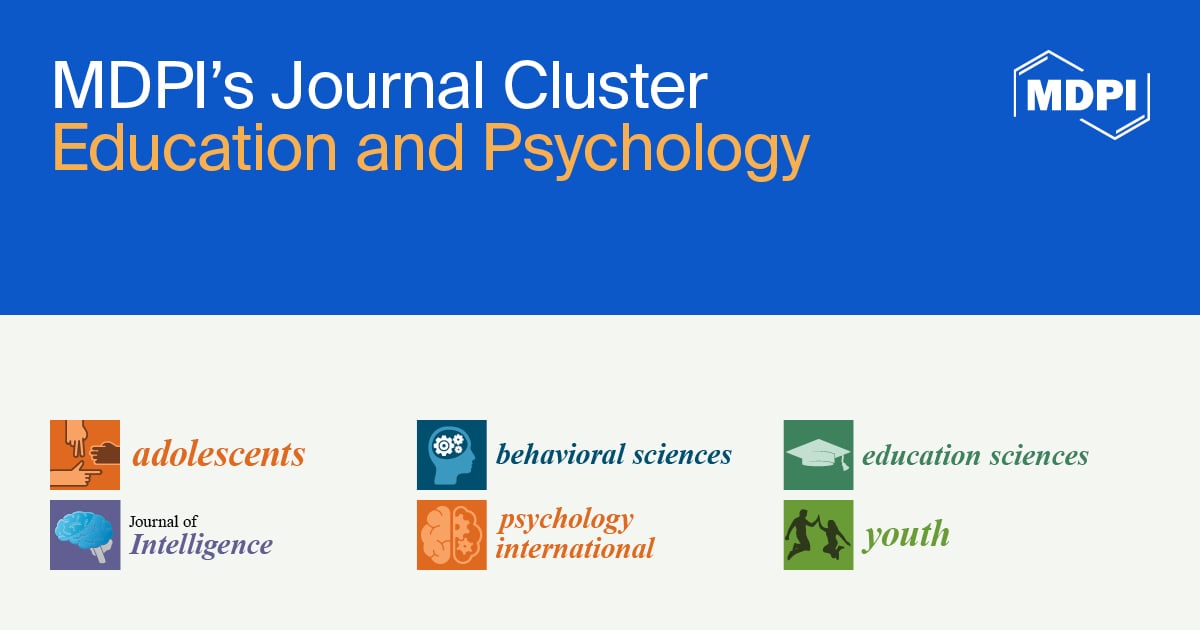
MDPI’s Journal Cluster of Education and Psychology
Education and Psychology (EP) is a research and academic initiative dedicated to exploring how psychological principles can be critically applied to deepen understanding and guide responses for essential processes, challenges, and disparities within educational settings. By examining the psychological dimensions of teaching, learning, motivation, identity, and behavior, EP seeks to inform and improve educational policy, practice, and equity. The group’s work is grounded in the belief that understanding human development and cognition is essential for designing responsive and inclusive education systems.
MDPI’s cluster of education and psychology journals supports interdisciplinary research that connects theory with practical application. By integrating psychological perspectives into educational contexts and applying educational insights to psychological inquiry, this cluster promotes research that leads to tangible, real-world improvements for students, teachers, and educational systems. The overarching aim is to advance understanding, strengthen support structures, and achieve better outcomes for everyone working at the core of education.
The six participating journals include:
- Adolescents focuses on adolescent development and health sciences, more specifically psychology, psychiatry, mental health, physical health, education, and growth and development. Adolescents is led by Editor-in-Chief Prof. Dr. Laura Hayman (Department of Nursing, Manning College of Nursing and Health Sciences, University of Massachusetts Boston, USA).
- Behavioral Sciences focuses on the intersection of psychiatry, neuroscience, psychology, cognitive and behavioral sciences, and behavioral biology. Behavioral Sciences is led by Editor-in-Chief Prof. Dr. Jerrell Cassady (Department of Educational Psychology, Ball State University, USA).
- Education Sciences focuses on technology-enhanced education, higher education, and educational psychology. It aims to synthesize information from disparate backgrounds, place research findings within a broad context, extend our methodological and theoretical understanding, and determine the likelihood of informing education policy and practice. Education Sciences is led by Editor-in-Chief Prof. Dr. Daniel Muijs (School of Social Sciences, Education and Social Work, Queen's University Belfast, UK).
- Journal of Intelligence focuses on the study of human intelligence, including psychology in human learning and cognition in education (individual differences in intelligence, cognitive development, affect, motivation, self-regulation, and self-concept, as well as their role in learning; the study of memory, conceptual processes, individual differences, etc.). Journal of Intelligence is led by Editor-in-Chief Prof. Dr. Con Stough (Centre for Human Psychopharmacology, Swinburne University of Technology, Australia).
- Psychology International focuses on all aspects of psychology, including neuropsychology, clinical psychology, cognitive psychology, sports psychology, educational psychology, social psychology, psychometrics, and mental health. Psychology International is led by Editor-in-Chief Prof. Dr. Antonio Hernández-Mendo (Department of Social Psychology, Social Anthropology, Social Work and Social Services, Universidad de Málaga, Spain).
- Youth focuses on numerous issues of interest to the research community involving youth including mental health, education, social development, employment, and other social perspectives of youth and young adulthood. Youth is led by Editor-in-Chief Prof. Dr. Todd Michael Franke (Department of Social Welfare, University of California, Los Angeles (UCLA), USA).
|
Journals |
Launch Year |
Impact Factor (2023) |
CiteScore (2023) |
First Decision (median ) |
Acceptance to Publication (median ) |
APC (CHF) |
 |
2021 |
/ |
1.3 |
40.5 |
5.4 |
1000 |
 |
2011 |
2.5 |
2.6 |
28.7 |
2.8 |
2200 |
 |
2011 |
2.5 |
4.8 |
29.8 |
3.8 |
1800 |
 |
2012 |
2.8 |
2.8 |
25.8 |
2.8 |
2600 |
 |
2019 |
/ |
/ |
16 |
6 |
1200 |
 |
2021 |
/ |
/ |
38.3 |
5.8 |
1000 |
MDPI Mission and Values
As a pioneer of academic open access publishing, MDPI has been serving the scientific community since 1996. Our aim is to foster scientific exchange in all forms across all disciplines. MDPI’s guidelines for disseminating open science are based on the following values and guiding principles:
Open Access: All of our content is published in open access and distributed under a Creative Commons License, providing free access to science and the latest research, allowing articles to be freely shared and content to be re-used with proper attribution.
Timeliness and Efficiency: Publishing the latest research through thorough editorial work, ensuring a first decision is provided to authors in under 32 days and papers are published within 7-10 days upon acceptance.
Simplicity: Offering user-friendly tools and services in one place to enhance the efficiency of our editorial process.
High-Quality Service: Supporting scholars and their work by providing a range of options such as journal publication at mdpi.com, early publication at preprints.org, and conferences on sciforum.net to make a positive impact on research.
Flexibility: Adapting and developing new tools and services to meet the changing needs of the research community, driven by feedback from authors, editors, and readers.
Rooted in Sustainability: Ensuring the long-term preservation of published papers and supporting the future of science through partnerships, sponsorships, and awards.
By adhering to these values and principles, MDPI remains committed to advancing scientific knowledge and promoting open science practices.
Selected Topics and Special Issues:
- “Well-Being and Coping Strategies in Educational Psychology”;
- “Educational and Health Development of Children and Youths”;
- “Organized Out-of-School STEM Education”;
- “Digitally Assisted Interventions in Special Education for Promoting Psychological Health, and Well-Being”.
Selected Articles:
- “Prevalence of Early Sexual Debut among Young Adolescents in Ten States of the United States”;
- “Mechanisms Linking Social Media Use and Sleep in Emerging Adults in the United States”;
- “What Is the Impact of ChatGPT on Education? A Rapid Review of the Literature”;
- “Predicting Everyday Critical Thinking: A Review of Critical Thinking Assessments”;
- “Breaking Barriers: Unraveling the Connection between Mental Health Literacy, Attitudes towards Mental Illness, and Self-Stigma of Psychological Help-Seeking in University Students”;
- “Positive Psychology Interventions to Increase Self-Esteem, Self-Efficacy, and Confidence and Decrease Anxiety among Students with Dyslexia: A Narrative Review”.